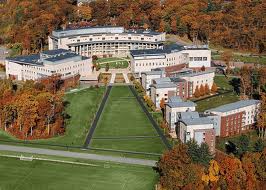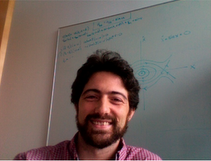Olin College, where I teach, is exceptional in many regards. It is an all undergraduate, highly selective, gender-balanced, engineering-only college which is miniscule in size (we have 342 students and 36 faculty) and quite new (our first class graduated in 2006). The brand of the college centers around project-based learning. Faculty are encouraged to maintain high-level research programs that are capable of supporting undergraduate projects while also being actively engaged in curriculum development.

Olin college
Having been trained during my doctoral and post-doctoral work at PhD-granting institutions, I found myself apprehensive about what would happen to my research momentum when I began work at Olin. During my training I learned from my mentors how to look with wonder at the mathematical world and turn over little pieces of it in my mind until I had found something new. I also learned how to tell a story with clarity and enthusiasm so that students could pay attention. As a mathematician in training, however, the skills of a researcher seemed to me so much more at the forefront. Though I cared deeply about being an effective teacher, developing new courses and taking on undergraduate students seemed daunting; it requires time and effort above and beyond the already demanding job of maintaining a dynamic research program while also practicing the craft of teaching. Then there is also the absence of sub-discipline specific weekly seminars with their associated influx of new people and new ideas that effectively transfer energy to one's own research program. These are real obstacles to proving theorems, no matter how much coffee is drunk.
What I have found at Olin has surprised and encouraged me. Rather than feeling overwhelmed by teaching and service, I have been sustained by the community of the college. I eat lunch with the undergraduates in the dining hall where we talk about math, at times directly related to coursework that they are struggling with but at times driven by their own nascent curiosity. I design courses collaboratively with senior colleagues where I receive valuable mentorship. By teaching the same student in different, subsequent classes, I get the unique joy of watching the development of their mathematical intuition.
As an undergraduate student at Swarthmore College, it did not strike me as unusual that undergraduates were encouraged to speak at department seminars and that their presentations were well-attended by the department faculty. Nor did it strike me as odd that well into the evening, professors in the department would make time to talk with me. Similarly, as an assistant professor at Olin College it did not seem strange that I received a phone call in the evening from the chair of the curriculum committee, herself an associate professor managing a high-level research program, to discuss a petition put forth by my advisee for a variance from study abroad rules. I don't find it odd that I take an active part recruiting undergraduates or make a point of going to see plays that my Putnam students act in. I even find myself drawing energy from engaging questions in the philosophy of pedagogy that I had never considered in graduate school: We use grades to simultaneously evaluate, provide feedback and motivate. The effect of this multitasking is to blunt each of these objectives. How can we design a course in which feedback, motivation and evaluation are provided by distinct mechanisms, each optimized to its task?
What I have found is that, rather than a distraction, these endeavors have pushed me and energized me. These human interactions give me energy that carries over to my research program where I continue to be amazed by the beauty of the mathematical world, turning over small pieces of it with my collaborators, slowly and occasionally finding something new.

Aaron Hoffman |
There are as many different answers to the question "how do you balance research and teaching?" as there are academics. At a four-year college, some people work intensively over the summer and in a more limited way during the school year, some people figure out how to integrate their research and teaching; for example, they find projects suitable for undergraduates that advance their own research program. Some people get grants that buy out teaching and work intensively during the semester. Some people just slow down. And some find the energy to do it all. In this regard, perhaps four-year colleges are not so different from big research universities after all.
|